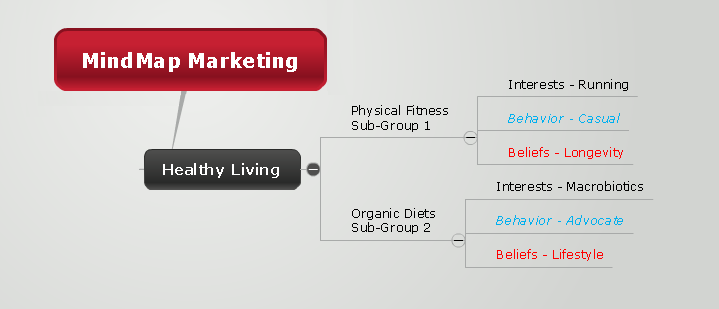Message Marketing with Mind Maps

Interests, Behaviors and Beliefs
 To work efficiently and effectively as a marketer (whether independently or as part of a larger group) you need the right tools and the right approach. As most readers are likely aware, platforms and services exist in abundance to help improve marketing campaign performance - just read Website Magazine's Big list of Marketing Automation Software. For those more involved with strategy than execution however, a powerful opportunity exists in mind maps.
To work efficiently and effectively as a marketer (whether independently or as part of a larger group) you need the right tools and the right approach. As most readers are likely aware, platforms and services exist in abundance to help improve marketing campaign performance - just read Website Magazine's Big list of Marketing Automation Software. For those more involved with strategy than execution however, a powerful opportunity exists in mind maps.
Defining Mind Mapping
Mind maps are visual diagrams which represent concepts and/or tasks that can be, or are by their very nature, connected. Using the many available solutions on the market such as Mindomo, Mindmesiter, or FreeMind will provide Web marketing teams a way to understand these connections, a framework to generate ideas (brainstorm), and a means to prioritize tasks and visualize progress. The ways in which mind maps can be used are many.
Website Magazine reader Dave Gammage for example commented on a recent Facebook poll that "Mind mapping is a great technique for just about any type of individual or team brainstorming - site creation, product creation, or problem solving." Most marketers, to their own detriment however, opt to work from "experience" and "intuition" - and often do so in a vacuum.
Mind Maps in Action
When applied to messaging and content development however, few tools are more useful than mind maps. Web marketers can employ mind maps to identify not just the primary groups or audiences but drill down into the sub-groups to more accurately explore the interests, behaviors and beliefs of these future clients/customers - which is what can really move performance indicators in a positive direction. Let's take a look at a practical example.
Interests: Consumers have a broad range of interests which typically have relationships all their own. One of the best ways to reveal these relationships are to map them out.
For example, if you sell a product to healthy living enthusiasts, not only do you know it is important to produce content for those interested in physical fitness, but drill further (or in a different direction) into healthy living and you might find some association with a macrobiotic diet as well - another sub-group to explore. Visually mapping out relationships early on will reveal not only the destinations to promote a product or service but entirely new opportunities for content development.
Article continues below....

Behaviors: While consumers have a broad range of interests which can help marketers develop appropriate product/service specific content, their behavior is another aspect with which it is important to become familiar and use in content development efforts. Are these prospects only casually interested or are they hard core, power-users? The answer is important as it provides us guidance as to how content might be developed and structured. Let's return to the healthy living example. Creating a mind map could reveal that many physical fitness enthusiasts are only casually involved. This might provide a signal to a content marketing team to create blog posts for these casual enthusiasts - for example, "Three Exercises You Can Do at Your Desk" or "Get Fit from Your Couch".
Beliefs: The worldview or belief system of your audience is also important in determining the best possible acquisition approach through content. When a marketer can understand "why" consumers are interested and can craft messages which resonate with these beliefs, message effectiveness can go through the virtual roof. Once again returning to our example, we know that in order to sell our health living products, we will be pursuing those interested in running/jogging that do so casually. But why are they interested in casual jogging? Dig deeper and you might one possible answer is "longevity". An entire series of articles could be created around longevity and health living, taking cues from interests and beliefs at the same time. One possible post - "How to Live to 100 in Fifteen Minutes a Day."
Get Started with Mind Maps
Mind maps provide the ability to foster an environment of collaboration, help identify the most practical solution, and provide a structure wherein an action plan can be created. When it comes to message-based marketing, seriously consider the use of the solutions. While considered to be nothing more than a creative exercise by some, these offerings do help improve the effectiveness and efficiency of your Web enterprise. Focus not just on the needs or wants of your prospective clients, but also on the interests, beliefs and behaviors of users for the greatest impact.
The Top MindMap Software Solutions

Mindomo: Features include team collaboration tools for teams, video, audio and image embeds, commenting and voting, spell-check, contact import, mind map exporting and more. Mindomo stands out with a desktop version which can sync with mind maps hosted on the Web allowing users to work from anywhere. Price: A free version is available (limited to three maps). Mindomo's also offers a premium version $6/mo and a version for teams which features a customized interface and a secure connection via https.

Mindmeister: One of the most prominent and popular mind map software solutions is Mindmeister. Features include sharing/collaboration tools, offline mode and handy browser widgets, ability to import maps from Freemind and MindManager, and map exporting and publishing to blogs and websites. Users of the business and enterprise levels have access to branded login and custom subdomains. Price: Free version (limited to three maps). The premium version costs $59/yr and business and enterprise plans start at $9/mo. A version for educational institutions is also available for $18/yr.
MindJet: Another of the premier mind map software solution for the enterprise is MindJet. Features include integration with Microsoft office, customizable slide shows and presentation views, strong navigation and viewing controls and much more. MindJet has been used by some big brands including IBM, Coca-Cola, Siemens, Wells Fargo and many others. Price:Available for both Mac ($249/license) and PC ($349/license).


Subscribe to Our Newsletter!
Latest in Marketing








